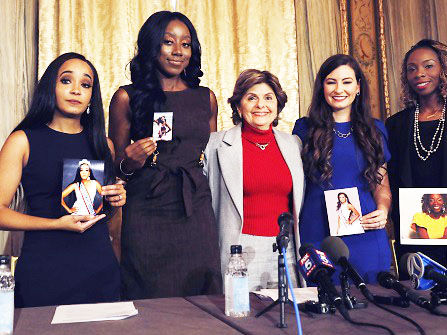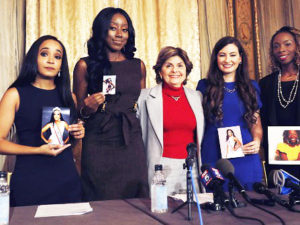

pageant and their lawyer, Gloria Allred (center)
A group of Mrs. America contestants’ complaints of racism about the pageant CEO and co-founder may open the floodgates for more allegations to come in the future. The complaints already have re-opened the door to the racist history of beauty pageants.
Black women have historically been shut out of pageants and forced to create their own contests. Members of this same group found themselves shut down again, saying that David Marmel made disparaging comments about African-Americans at the Mrs. America competition in Las Vegas in August. Four contestants — three Black and one white — called out Marmel for racist remarks that included him having repeatedly hurled the N-word.
Marmel also allegedly said that Black women “need to stop having so many babies,” the women said during a press conference Monday. His other alleged offenses included saying that Black men were “drug dealers, incarcerated in jail, on welfare and killing each other.” Mrs. Delaware Kimberly Phillips, Mrs. New Jersey Crissy Timpson, Mrs. Ohio Jeri Ward and Mrs. Missouri Brandy Palacios made clear their feelings, with the help of high-profile women’s rights lawyer Gloria Allred, USA Today reported.
Adding insult to injury, the women also called out Marmel for allegedly having compared his skin tone to the Black contestants. The women reportedly don’t plan to file a lawsuit. Instead, they want an apology from Marmel and equal treatment for contestants. However, a lawsuit would be a likely move based on the claims and the painful history of racism in beauty pageants.
It was 50 years ago that protesters and feminists took on the Miss America pageant to fight for women for the first time since the pageant’s creation in 1921, according to the Smithsonian. They were sick and tired of the pageant’s vain and oppressive standards of judging women on their appearance and white skin: “Rule 7″ stated that Miss America contestants had to be “of good health and of the white race” before it was thrown out in 1940. At the time of the protest in 1968, a Black woman had not been crowned winner nor invited to participate in the pageant.
Black women didn’t wait for an invite; they created their own pageants. The first-ever Miss Black America pageant was born as a result of the mainstream pageant blackout that same year as the protest. The inaugural pageant celebrated Blackness as beautiful — a message that still gets lost in translation in those same spaces today.
The Mrs. American contestants’ stories about Marmel indicated that some mainstream pageants were still not as inclusive as needed.

Be the first to comment